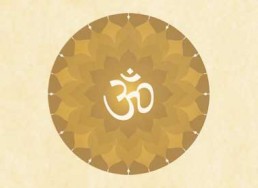Purusha Suktam
स भूमिं विश्वतो वृत्वात्यतिष्ठद्दशाङुलम् ॥१॥
Sa Bhūmim Viśvato Vrtva-ātya[i]-ṭisstthad-ḍaśa-āngulam ||1||
उतामृतत्वस्येशानो यदन्नेनातिरोहति ॥२॥
ūta-āmrtatvasye[a-ī]śāno ẏad-ānnena-āti-ṟohati ||2||
पादोऽस्य विश्वा भूतानि त्रिपादस्यामृतं दिवि ॥३॥
Pādo-āsya Viśvā Bhūtāni ṭri-Pād-āsya-āmrtam ḍivi ||3||
ततो विष्वङ् व्यक्रामत्साशनानशने अभि ॥४॥
ṭato Vissvang Vya[i-ā]krāmat-Sāśana-ānaśane ābhi ||4||
स जातो अत्यरिच्यत पश्चाद्भूमिमथो पुरः ॥५॥
Sa Jāto ātya[i-ā]ricyata Paścād-Bhūmim-ātho Purah ||5||
वसन्तो अस्यासीदाज्यं ग्रीष्म इध्मः शरद्धविः ॥६॥
Vasanto āsya-āsīda-ājyam ġrīssma īdhmah ṣarad-[d]ḥavih ||6||
तेन देवा अयजन्त साध्या ऋषयश्च ये ॥७॥
ṭena ḍevā āyajanta Sādhyā ṟssayaś-Ca ẏe ||7||
पशून्ताँश्चक्रे वायव्यानारण्यान् ग्राम्याश्च ये ॥८॥
Paśūn-ṭāścakre Vāyavyān-āarannyān ġrāmyāś-Ca ẏe ||8||
छन्दांसि जज्ञिरे तस्माद्यजुस्तस्मादजायत ॥९॥
chandāmsi Jajnyire ṭasmād-ẏajus-ṭasmād-ājāyata ||9||
गावोः ह जज्ञिरे तस्मात् तस्माज्जाता अजावयः ॥१०॥
ġāvoh ḥa Jajnyire ṭasmāt ṭasmāj-Jātā ājā-Vayah ||10||
मुखं किमस्य कौ बाहू का ऊरू पादा उच्येते ॥११॥
ṃukham k͟himasya k͟hau Bāhū k͟hā ūurū Pādā ūcyete ||11||
ऊरू तदस्य यद्वैश्यः पद्भ्यां शूद्रो अजायत ॥१२॥
ūurū ṭad-āsya ẏad-Vaiśyah Padbhyām ṣūdro ājāyata ||12||
मुखादिन्द्रश्चाग्निश्च प्राणाद्वायुरजायत ॥१३॥
ṃukhād-īndraś-Ca-āgniś-Ca Prānnād-Vāyur-ājāyata ||13||
पद्भ्यां भूमिर्दिशः श्रोत्रात्तथा लोकाँ अकल्पयन् ॥१४॥
Padbhyām Bhūmir-ḍiśah ṣrotrāt-ṭathā l̤okā ākalpayan ||14||
देवा यद्यज्ञं तन्वाना अबध्नन्पुरुषं पशुम् ॥१५॥
ḍevā ẏadyajnyam ṭanvānā ābadhnan-Purussam Paśum ||15||
ते ह नाकं महिमानः सचन्त यत्र पूर्वे साध्याः सन्ति देवाः ॥१६॥
ṭe ḥa ṇākam ṃahimānah Sa-Canta ẏatra Pūrve Sādhyāh Santi ḍevāh ||16||

Description
The Purusha Suktam gives a description of the spiritual unity of the universe. It presents the nature of Purusha, or the cosmic being, as both immanent in the manifested world and yet transcendent to it. From this being, the Suktam holds, the original creative will (identified with Viswakarma, Hiranyagarbha or Prajapati) proceeds which causes the projection of the universe in space and time.The Purusha Suktam, in the seventh verse, hints at the organic connectedness of the various classes of society. It is hymn 10.90 of the Rigveda, dedicated to the Purusha, the “Cosmic Being”. It is also found in the Shukla Yajurveda Samhita 30.1-16 and Atharva Veda Samhita 19.6.
Other Om Shlokams
Anantam Vasukim Sesham
Anantha, Vasuki, Sesha, Padmanabha and Kambala, Shankapala, Dhritharashtra, Thakshaka and Kaliya are the names of nine great serpents
Bali Vibhishano Bhishma
Bali, Vibhisana, Bhishma, Prahlada, Narada, Dhruva - these are the six famous Vishnu-bhaktas - meditating upon all of these, will destroy sins.
Dharmo Vivardhati Yudhishtira
Dharma grows with the praise of Yudhistira, sins die with the praise of Bhima, enemies are extinguished with the praise of Arjuna, there will be no ill-health with the praise of Nakula and Sahadeva.
Harim Haram Harishchandram
Hari, Hara, Harischandra, Hanuman, and Halayudha (Balaram), if these five 'Ha's are meditated upon, when getting up from the bed in the morning, there will not be even a touch of harm.
Kapilam Darpanam
Upon waking one should see the Sun, mirror, cow, prosperous people, kings, teachers and donors of food.
Kapilam Kamadhenum Ca
May we meditate on Kapila, Kamadhenu, Kalpavriksha, Kaustubha(gem), Lakshmi, the daughter of the ocean, Kubera and Moon.
Karkotakasya Nagasya
Singing in praise of the Karkotaka serpent by Damayanthi for Nala, and in praise of Raja-rishi Rutuparna - led to the destruction of Kali.
Mulato Brahmarupaya
To you, O Vriksharaja (King of trees) who takes on the form of Brahma at the roots, Vishnu in the middle and Shiva at the extremes, our salutations
Mule Brahma Tvaci Vishnu
Brahma is at the root, Vishnu is in the bark and Sankara is in the branches, all devas are in each and every leaf. Salutation to you O Vaasudeva.
Na Karmana Na Prajaya
Not by work, nor by progeny or by wealth, but by renunciation alone have some attained immortality. That (immortality) which is even beyond the heaven, is attained by the self-controlled reununciates
Na Tatra Suryo Bhati
Neither does the sun shine there, nor the moon with all the stars, nor does this lightning shine. What to say of this fire? Everything shines after him who alone shines. By His light all this shines v
Omkaram Bindu Samyuktham
Yogis meditate forever on Aumkara associated with the Bindhu, salutation to the Aumkara, the grantor of wishes and salvation. We call on Thee, Lord of the hosts, the poet of poets, the most famous of
Prahlada Narada
I remember and meditate upon the Bhagavathas (god's ardent devotees) Prahlada, Narada, Parasara, Pundarika, Vyasa, Ambarisha, Shuka, Shaunakha, Bhishma, Rukma, Angadha, Arjuna, Vashishta, Vibhishana -
Prātah Smaranam
This is a prayer composed by Sri Adi Shankaracharya consisting of three stanzas in which the mind (manas) speech (vak), and body (kaya) of the individual are sought to be dedicated to the supreme Spir
Punya Shloko Nalo raja
Extolled for their virtues are King Nala, Yudhishtira, Sita and Janardhana
Purna Kumbha Mantra
Pūrna-kumbha mantra The four verses of the purna-kumbha-mantra, from na karmanā na prajayā to yah parah sah maheśvarah,are typically chanted when
Rajadhi Rajaya Prasahya
Om. We offer our salutations unto the Lord, the king of kings, the satisfier of desires. May the Lord of desires give me, the seeker of desires, what I desire. Salutations unto the Lord, the great kin
Sanyasa Suktam
Excerpt from the book 'Prayer Guide' by Swami Dayananda Saraswati NA KARMANA Amrtatvam anasuh, amrtatvam anasire praptavantah, these people have gained immortality or freedom
Sarve Veda Yatpadam
All the Vedas talk about which goal, to know which, people take to a life of study and spiritual discipline, I tell you in brief - that is om.
Somanatha Vaidyanatha
Meditating in the mornings everyday on Somanatha, Vaidyanatha, Dhanvantari and the Ashwini twins, will make one free from even the touch of ill-health.
Yani Kani Ca Papani
Yani Kani Ca Papani - Oh god! Whatever sins I have committed all my lives (including previous lives), please destroy them with every step I take around you. - In Sanskrit with Audio, in multiple languages with English Meaning and Significance.
Purusha Suktam – Om – In Sanskrit with English Transliteration, Translation and Meaning. Commentary for selected Shlokams.
